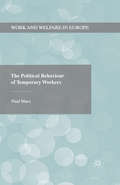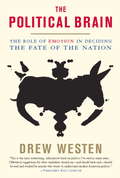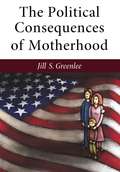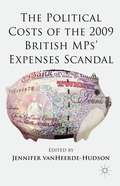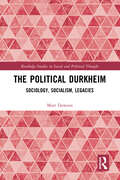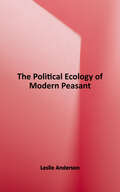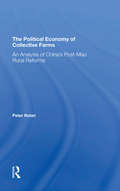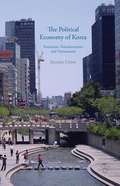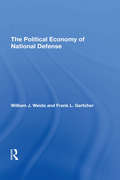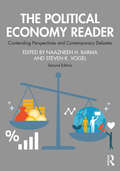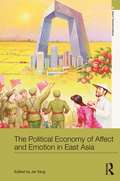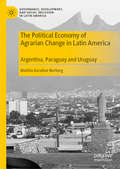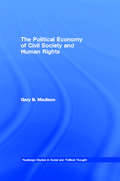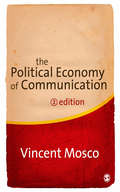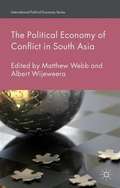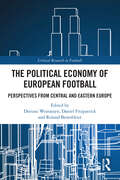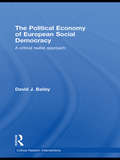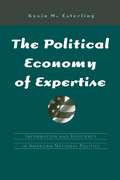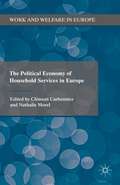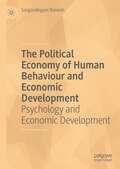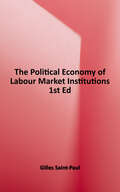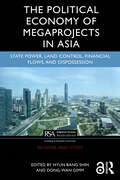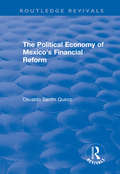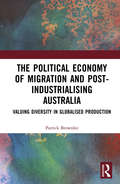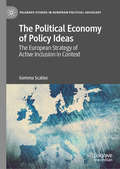- Table View
- List View
The Political Behaviour of Temporary Workers (Work and Welfare in Europe)
by Paul MarxInsecure temporary employment is growing in Europe, but we know little about how being in such jobs affects political preferences and behaviour. Combining insights from psychology, political science and labour market research, this book offers new theories and evidence on the political repercussions of temporary jobs.
The Political Brain: The Role of Emotion in Deciding the Fate of the Nation
by Drew WestenThe Political Brain is a groundbreaking investigation into the role of emotion in determining the political life of the nation. For two decades Drew Westen, professor of psychology and psychiatry at Emory University, has explored a theory of the mind that differs substantially from the more "dispassionate" notions held by most cognitive psychologists, political scientists, and economists#151;and Democratic campaign strategists. The idea of the mind as a cool calculator that makes decisions by weighing the evidence bears no relation to how the brain actually works. When political candidates assume voters dispassionately make decisions based on "the issues," they lose. That's why only one Democrat has been re-elected to the presidency since Franklin Roosevelt#151;and only one Republican has failed in that quest. In politics, when reason and emotion collide, emotion invariably wins. Elections are decided in the marketplace of emotions, a marketplace filled with values, images, analogies, moral sentiments, and moving oratory, in which logic plays only a supporting role. Westen shows, through a whistle-stop journey through the evolution of the passionate brain and a bravura tour through fifty years of American presidential and national elections, why campaigns succeed and fail. The evidence is overwhelming that three things determine how people vote, in this order: their feelings toward the parties and their principles, their feelings toward the candidates, and, if they haven't decided by then, their feelings toward the candidates' policy positions. Westen turns conventional political analyses on their head, suggesting that the question for Democratic politics isn't so much about moving to the right or the left but about moving the electorate. He shows how it can be done through examples of what candidates have said#151;or could have said#151;in debates, speeches, and ads. Westen's discoveries could utterly transform electoral arithmetic, showing how a different view of the mind and brain leads to a different way of talking with voters about issues that have tied the tongues of Democrats for much of forty years#151;such as abortion, guns, taxes, and race. You can't change the structure of the brain. But you can change the way you appeal to it. And here's how#133;
The Political Consequences Of Motherhood
by Jill GreenleeFrom civically and politically engaged women linking their identity as “mothers” to their fight for prohibition, public sanitation, and protective labor laws to the general call to arms of “mama grizzlies” issued by Sarah Palin in 2010, American political activists and candidates have used motherhood to rally women’s interest, support, and participation throughout American history. Politicized motherhood persists, and motherhood continues to inspire women’s participation and direct their concerns. In The Political Consequences of Motherhood, Jill S. Greenlee investigates the complex relationship between motherhood and women’s political attitudes. Combining a historical overview of the ways motherhood has been used for political purposes with recent political opinion surveys and individual-level analysis, she explains how and when motherhood shapes women’s thoughts and preferences. Greenlee argues that two mechanisms account for the durability of motherhood politics. First, women experience attitudinal shifts when they become mothers. Second, “mother” is a broad-based identity, widely shared and ideologically unconstrained, that lends itself to appeals across the political spectrum to build support for candidates and policy issues.
The Political Costs of the 2009 British MPs� Expenses Scandal: Doing Time, Doing Freedom (Palgrave Studies in Prisons and Penology)
by Jennifer Vanheerde-HudsonThis study examines the evolution and political consequences of the 2009 British MPs' expenses scandal. Despite claims of a revolution in British politics, we show how the expenses scandal had a limited, short-term impact.
The Political Durkheim: Sociology, Socialism, Legacies (Routledge Studies in Social and Political Thought)
by Matt DawsonThis book presents Durkheim as an important political sociologist, inspired by and advocating socialism. Through a series of studies, it argues that Durkheim’s normative vision, which can be called libertarian socialism, shaped his sociological critique and search for alternatives. With attention to the value of this political sociology as a means of understanding our contemporary world, the author asks us to look again at Durkheim. While Durkheim’s legacy has often emphasised the supposed conservative elements and stability advocated in his thought, we can point to a different legacy, one of a radical sociology. In dialogue with the decolonial critique, this volume also asks ‘was Durkheim white?’ and in doing so shows how, as a Jew, he experienced significant racialisation in his lifetime. A new reading and a vital image of a ‘political Durkheim’, The Political Durkheim will appeal to scholars and students with interests in Durkheim, social theory and political sociology.
The Political Ecology of the Modern Peasant: Calculation and Community
by Leslie E. AndersonDoes political action by peasants primarily serve the interests of the individual or does it address community concerns as well? Previous attempts to resolve this question often become mired in the age-old debate over selfish versus altruistic behaviour. In "The Political Ecology of the Modern Peasant", Leslie Anderson goes beyond the polarized positions of previous discussion to reach a new synthesis in which individual and community interests are shown to be both interdependent and mutually sustaining. <p><p>Anderson begins by demonstrating that peasant political behavior is far more complex than previously thought, ranging over a broad spectrum from the deliberate choice of quiescence to political violence or revolution. Within these two extremes, she examines the motivation underlying a variety of non-violent collective actions. Her theory explains each of these forms of peasant action with reference to a particular worldview - the political-ecological perspective - that peasants gain from living in a given social context that links the individual, the village, the natural environment and society. <p><p>Drawing on personal experience in the villages of Costa Rica and Nicaragua, Anderson puts forth a theory with broad implications for the study of peasant political behavior in Latin America and throughout the Third World. "The Political Economy of the Modern Peasant" aims to be of interest not only to political scientists but to anthropologists, sociologists and students of developing countries and Latin America.
The Political Economy Of Collective Farms: An Analysis Of China's Post-mao Rural Reforms
by Peter NolanThis book examines the case for and against collective farms in developing countries. Basing his account on a careful analysis of China's rural economy from the 1950s to the 1980s, the author argues that collective farms have serious shortcomings and that they are not the most suitable institutional form for rural economic development in poor count
The Political Economy Of Korea
by Jitendra UttamKorea's twin transitions - agrarian to industrial and industrial to post-industrial - transformed the country's political economy. Moving away from the traditional focus on aspects such as market, culture, and colonialism, the author argues that Korea's 'second state' was revitalized through the 'people's movement' and 'citizens movement'.
The Political Economy Of National Defense
by William J Weida Franklin L GertcherThis timely and wide-ranging study covers both the economic and the political aspects of defense spending—first by providing a theoretical framework and then by explaining, in a political economy context, the results of decisions to allocate scarce resources to defense. In doing so, the authors provide a comprehensive picture of the interaction between defense spending and the economic and political structure of the United States, complementing their exploration of topical concerns such as SDI with analysis of long-term trends and issues of timeless importance in the defense debate. Because of the politicizing of defense planning and procurement, there have been few significant applications of optimization techniques to high-level defense issues over the past decade. As a result, there has been a rapid decline in the importance of those techniques—historically the focus of books on defense economics. Like its predecessors, this book presents optimization techniques applicable to a wide variety of defense problems, but it also illustrates what happens in actual practice and why defense decisions are often not economically efficient. The authors discuss alternatives for cases when political constraints make efficient solutions unlikely and explore changes in the defense establishment and political structures that would make economically efficient resource allocations a reality.
The Political Economy Reader: Contending Perspectives and Contemporary Debates
by Naazneen H. BarmaThe Political Economy Reader advocates a particular approach to the study of political economy – the "market-institutional" perspective – which emphasizes the ways in which markets are embedded in political and social institutions. This perspective offers a compelling alternative to the market-liberal view, which advocates freer markets and less government intervention in the economy, as if states and markets were naturally at odds with each other. The reader embraces a truly interdisciplinary approach to the study of political economy, with extensive coverage from sociology, economics, history and political science. It includes some of the most important classical and contemporary theoretical perspectives on political economy. And it engages some of the most topical debates in political economy today, such as climate change, the global financial crisis, inequality, the digital platform economy, and the COVID-19 pandemic. For political economy courses at a variety of levels and from a range of disciplines, the reader is also of interest to scholars and citizens wanting perspective on the intersection of economics, politics, and society. New to the Second Edition • More than 20 new readings included by such notables as Elinor Ostrom, E. J. Hobsbawm, Dani Rodrik, Amartya Sen, Thomas Piketty, and Mariana Mazzucato among many others. • Fully updated introductions to the book and each thematic chapter of readings. • Coverage of key emerging debates including climate change, the financial crisis, inequality, the digital platform economy, and COVID-19
The Political Economy of Affect and Emotion in East Asia (Asia's Transformations)
by Jie YangWhen thinking about the culture and economy of East Asia, many attribute to the region a range of dispositions, including a preference for consensus and social harmony, loyalty and respect towards superiors and government, family values, collectivism, and communitarianism. Affect is central to these concepts, and yet the role of affect and its animated or imagined potentialities in the political economy of East Asia has not been systematically studied. The book examines the affective dimensions of power and economy in East Asia. It illuminates the dynamics of contemporary governance, and ways of overcoming common Western assumptions about East Asian societies. Here, affect is defined as felt quality that gives meaning and imagination to social, political, and economic processes, and as this book demonstrates, it can provide an analytical tool for a nuanced and enriched analysis of social, political, and economic transformations in East Asia. Through ethnographic and media analyses, this book provides a framework for analyzing emerging phenomena in East Asia, such as happiness promotion, therapeutic governance, the psychologization of social issues, the rise of self-help genres, transnational labor migration, new ideologies of gender and the family, and mass-mediated affective communities. Through the lens of affect theory, the contributors explore changing political configurations, economic engagements, modes of belonging, and forms of subjectivity in East Asia, and use ethnographic research and discourse analysis to illustrate the affective dimensions of state and economic power and the way affect informs and inspires action. This interdisciplinary book will be of great interest to students and scholars of Asian studies, anthropology, sociology, media studies, history, cultural studies, and gender and women’s studies.
The Political Economy of Agrarian Change in Latin America: Argentina, Paraguay and Uruguay (Governance, Development, and Social Inclusion in Latin America)
by Matilda Baraibar NorbergThis book makes an original contribution to the discussion about agro-food exporting countries’ governmental policy. It presents a historicized and internationally contextualized exploration of the political economy of agrarian change in three Latin American countries: Argentina, Praguay, and Uruguay. By comparatively examining how these states have acted in a context of global driven market forces and historically formed institutions, the monograph illuminates the differing capacities of state autonomy under the present era of globalized agriculture.
The Political Economy of Civil Society and Human Rights (Routledge Studies in Social and Political Thought)
by Gary B. MadisonMadison uses the concept of civil society and his distinctive version of 'communicative rationality' to provide a closely-argued and robust defence of the neo-liberal political and economic tradition. Writing with considerable elegance and humour, the author draws on the hermeneutical and neo-pragmatist traditions, and on a diverse range of evidence and discussion, mainly concerning transitional economies and societies in Eastern Europe and around the world. Providing a systematic analysis of the multi-faceted notion of civil society, this book shows in detail how the three main orders of civil society - the moral-cultural, the political, and the economic - constitute 'spheres of autonomy'. At the same time, it illustrates how these different orders are closely interrelated and interact in a synergetic manner. A unique feature of this study is the way in which the author demonstrates how the logic of the various orders of civil society is, in a way appropriate to the distinct nature of each order, a logic of communicative rationality. The work concludes by arguing that the only sure way of achieving international justice is by the construction of civil society world-wide.
The Political Economy of Communication: Rethinking And Renewal (Media, Culture And Society Ser.)
by Vincent Mosco"A masterpiece... the one single indispensable book that all media students and scholars need to read to understand this vital and growing area of research." - Robert W. McChesney, University of Illinois at Urbana-Champaign "A contemporary classic of media studies. Vincent Mosco, among the leading media scholars of our or any time, brings his searing insights and crystal prose to bear on the latest issues and debates of the field... An indispensable resource for researchers, activists, and students everywhere." - Toby Miller, University of California, Riverside Since publication of its first edition, The Political Economy of Communication has established itself as a true classic and one of the most important contributions to the field. This second edition has been thoroughly restructured, updated and expanded to make it an indispensable text for students and scholars alike. Putting the student at the centre of its updates, this book: Maps the definitions and foundations of political economy Adds 3 new chapters to explore current trends, from feminism and labour to new media, forms of resistance, media reform and democracy Illustrates throughout how power operates across the 21st century media landscape Explores key issues in how media power intersects with globalization, social class, race, gender and surveillance Shows media students why it is essential to understand political economy and its application to media and communication. Combining penetrating theoretical analysis with passionate commitment, Vincent Mosco once again gives readers an indispensable introduction to the field.
The Political Economy of Conflict in South Asia
by Matthew J. Webb Albert WijeweeraDestructive conflicts have thwarted growth and development in South Asia for more than half a century. This collection of multi-disciplinary essays examines the economic causes and consequences of military conflict in South Asia from a variety of perspectives embracing fiscal, social, strategic, environmental and several other dimensions.
The Political Economy of European Football: Perspectives from Central and Eastern Europe (Critical Research in Football)
by Dariusz Wojtaszyn, Daniel Fitzpatrick and Roland BenedikterThis book explores the contemporary dynamics of European football’s political economy, mapping the various market and regulatory forces that shape its current position and development.Offering a conceptual framework for understanding political economy as applied to the study of football, this book presents in-depth case studies from Central and Eastern Europe – a region largely underexplored in the research literature – that enable the reader to gain a sense of the rich history and diversity of the economic and social contexts in which European football is shaped. The first part of this book sets out the market structure of football in Europe and considers how key trends of globalisation and hypercommercialisation have been addressed through attempts to incentivise and regulate the football market. It presents a theoretical framework for political economy in football and explores key issues including football and economic development; UEFA’s ‘Financial Fair Play’ regulations; sponsorship in football; and the socio-economic conditions of hooligan violence. The second part of the book looks more closely at Central and Eastern Europe. Presenting case studies of aspects of political economy in football in Romania, Poland, East Germany, Austria and Hungary (including development of the women’s game), this book shows how the economic development of European football has been uneven, not only subject to global trends but also dependent on local historical, political, economic and organisational conditions.Opening up new perspectives on the complex interactions between states, sports organisations, markets and society, this book will be fascinating reading for anybody with an interest in football, the history, politics or business of sport, or political economy as a field of scholarly enquiry.
The Political Economy of European Social Democracy: A Critical Realist Approach
by David J. BaileyThis book takes an in-depth look into recent developments in European social democracy. It begins by highlighting the somewhat paradoxical turn by a number of social democratic parties towards enhanced support for European integration, a move that has occurred despite the apparently ‘neoliberal’ direction of much of EU policy-output. A critical realist method is adopted, informed by both Marxist and anarchist critiques of social democratic parties, to argue that we can view this paradoxical development as resulting from the inherently unstable representation of constituents’ demands for decommodification, a process central to traditional social democratic parties. In making this argument, the book traces the transformation from ‘traditional’ to ‘new’ (or ‘third way’) social democratic parties in the UK, Sweden, France, Italy and Spain. It also outlines some of the most important developments in social democratic policy-making at the European level. The book therefore provides an in-depth, theoretically-original, analytical narrative of the key empirical developments to affect contemporary social democratic parties in recent years. In highlighting some of the contradictions inherent to both ‘traditional’ and ‘new’ social democratic parties, the book does much to suggest some of the reasons for their continued decline over the past three decades. David Bailey completed his PhD at the London School of Economics, and currently teaches at the University of Birmingham. His research focuses on social democratic parties and European integration. He has published articles in the Journal of Common Market Studies, and Comparative European Politics.
The Political Economy of Expertise: Information and Efficiency in American National Politics
by Kevin M. EsterlingThe Political Economy of Expertise is a carefully argued examination of how legislatures use expert research and testimony. Kevin Esterling demonstrates that interest groups can actually help the legislative process by encouraging Congress to assess research and implement well-informed policies. More than mere touts for the interests of Washington insiders, these groups encourage Congress to enact policies that are likely to succeed while avoiding those that have too great of a risk of failure. The surprising result is greater legislative efficiency. The Political Economy of Expertise illustrates that this system actually favors effective and informed decision making, thereby increasing the likelihood that new policies will benefit the American public.
The Political Economy of Household Services in Europe (Work and Welfare in Europe)
by Clément CarbonnierThis edited volume assesses from a variety of perspectives the policies introduced to support the development of household services across Europe. It highlights the impact of these costly policies on the creation of low quality jobs and on labour market dualisation, and questions their social and economic outcomes.
The Political Economy of Human Behaviour and Economic Development: Psychology and Economic Development
by Sangaralingam RameshThis book explores how economics can be based around studies on human behaviour, rather than relying on overly simplified assumptions generated from mathematical modelling. Through examining the link between human economic activity and psychology, specifically regarding the development of cognitive and non-cognitive ability, insight into the human dimensions of economic development and the sources of human inequality are provided.This book aims to question assumptions of rationality utilised in neoclassical economic theory and suggest how economic activity can be better understood through a deeper recognition of human behaviour. It will be relevant to students and researchers interested in the political economy and behavioural economics.
The Political Economy of Labour Market Institutions
by Gilles Saint-PaulAccording to most orthodox economists, labour market rigidities are the key culprit for such high unemployment as has been observed in Europe during the past three decades. But governments that have attempted to follow the standard prescription of removing rigidities have often faced harsh political opposition. This book looks at why labour market institutions such as employment protection, unemployment benefits, and relative wage rigidities exist, what role they play in society, why they seem so persistent, where the pressure to reform them comes from, and whether reform can be politically viable or not. The book ascribes a central role to the existence of underlying microeconomic frictions and to redistributive pressures between rich and poor, and shows how these ingredients may give rise to labour market rents, which in turn explain why a coherent set of rigidities arise as the outcome of the political process. It is also shown that, at the same time, such rents create resistance to reform, and contribute to locking society into a high-unemployment, rigid equilibrium. Finally, the basic principles exposed in the book are used to discuss various strategies for a successful labour marketer form.
The Political Economy of Megaprojects in Asia: State Power, Land Control, Financial Flows, and Dispossession (Regions and Cities)
by Hyun Bang Shin Dong-Wan GimmThis book offers a comprehensive analysis of how the developmental goals of Asian states are reflected in large-scale projects and how various actors both realize and challenge these goals. The rise of Asian economies has spurred the proliferation of megaprojects through large-scale resource mobilization, necessitating varying degrees of state intervention. Despite neoliberal pressures, these projects remain linked to national developmental aspirations, driven by domestic, transnational, or combined pro-growth interests, and serve multiple political purposes.The book advances the argument that megaprojects embody the dynamics of multiscalar strategic relations that determine the process and outcome of urbanization. These projects create iconic landmarks, new towns, central business districts, and infrastructure, showcasing intertwined political and economic interests. By examining contemporary megaprojects in China, South Korea, Taiwan, India, Malaysia, and Turkey, the contributing authors reveal the complexity of urbanizing forces and their multiscalar nature in shaping the built environment and shed light on the intricate interplay of state strategies, economic needs, and sociopolitical forces that influence urban landscapes.This interdisciplinary work provides a nuanced understanding of the political economy underpinning Asian urbanization and contributes to ongoing debates on urban development, state–society relations, and the production of space in the context of globalization.Chapter 1 of this book is freely available as a downloadable Open Access PDF at http://www.taylorfrancis.com under a Creative Commons Attribution-Non Commercial-No Derivatives (CC BY-NC-ND) 4.0 license.
The Political Economy of Mexico's Financial Reform (Routledge Revivals)
by Osvaldo Santin QuirozThis title was first published in 2001. An analysis of the political economy of Mexico's financial reform. It is organized in three parts. The first part - chapters one to four - develops the framework, both historical and institutional. The first chapter outlines the theoretical discussion on state autonomy and develops a simple analytical framework to study public policy decisions. The subsequent three chapters address three main themes: external dependency of domestic states on international capital, political change under President Carlos Salinas and financial policy in Mexico. The second part presents the analysis of three main institutional changes to the financial system - development banking reform, commercial banking privatisation and autonomy of the central bank. Each specific case study shows how the reforms conformed to the ideas of the dominant consensus on economic policy and how they delivered an inefficient incentive structure. The third part - chapter eight - brings together all the elements to explain Mexico's 1994 financial crisis.
The Political Economy of Migration and Post-industrialising Australia: Valuing Diversity in Globalised Production
by Patrick BrownleeDuring the 1980s and 1990s, Australia’s migration intake turned rapidly towards recruiting business professionals, managers and entrepreneurs to support the country’s entry into an economic system marked by global value chains. This book analyses the policy idea termed Productive Diversity, introduced by the Australian government as a way of conceptualising the belief that migrants would bring business acumen and a global outlook to help Australia compete as a trading nation. The book examines this germinal period of Australia’s economic reorientation through a close inspection of policy documents, parliamentary hearings, economic and migration statistics, and interviews with the architects of the policy. It provides a comprehensive account of how the policy framework emerged, how it was implemented, and studies the rationale in recruiting self-starters and managers to connect with global trade flows. This work will be of interest to students and researchers of migration studies, especially Australian migration, diversity policies, sociology, multiculturalism, economics, development studies, and Asia-Pacific studies. The methods and data will also be of value to political economists and policy makers.
The Political Economy of Policy Ideas: The European Strategy of Active Inclusion in Context (Palgrave Studies in European Political Sociology)
by Gemma ScaliseIn 2008, the European Commission relaunched the policy idea of active inclusion, with the aim of facilitating the integration of people into sustainable and quality employment. Over ten years later, and in the aftermath of one of the most trying periods in Europe’s recent economic history, this book provides a critical and timely reassessment. The Political Economy of Policy Ideas contributes to the growing scholarly literature on ideational political economy and labour market regulation by providing a systematic analysis of the idea of active inclusion and its three core principles: activation, conditionality and personalization. The research breaks new ground by detailing how divergent interpretations of these principles, by relevant social actors in different contexts, have shaped their implementation. The book is of interest to scholars and students across comparative political economy, economic sociology, welfare and industrial relations studies.
